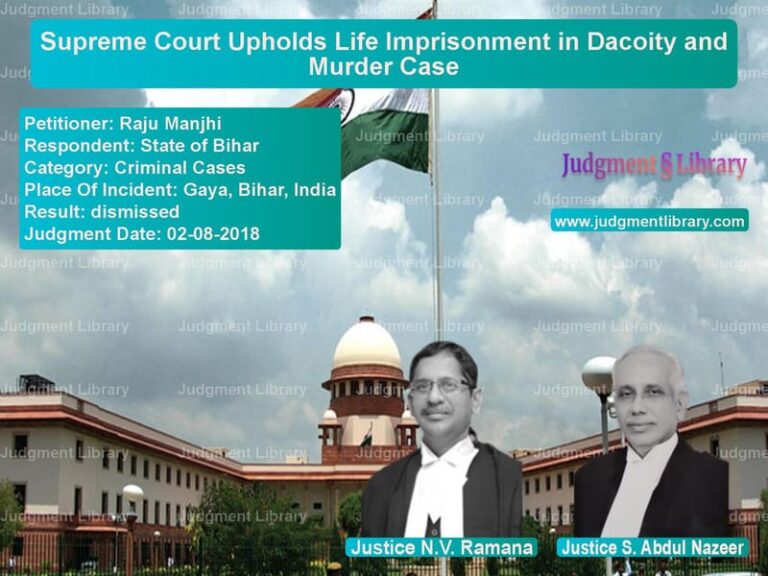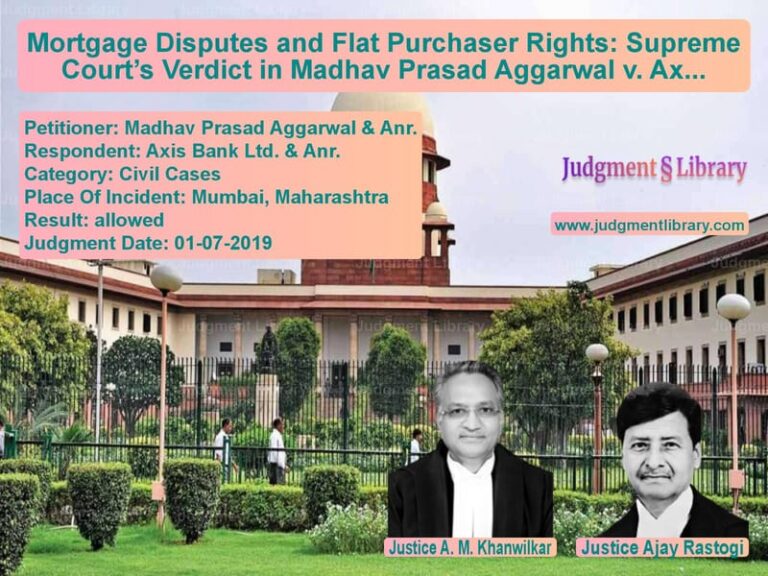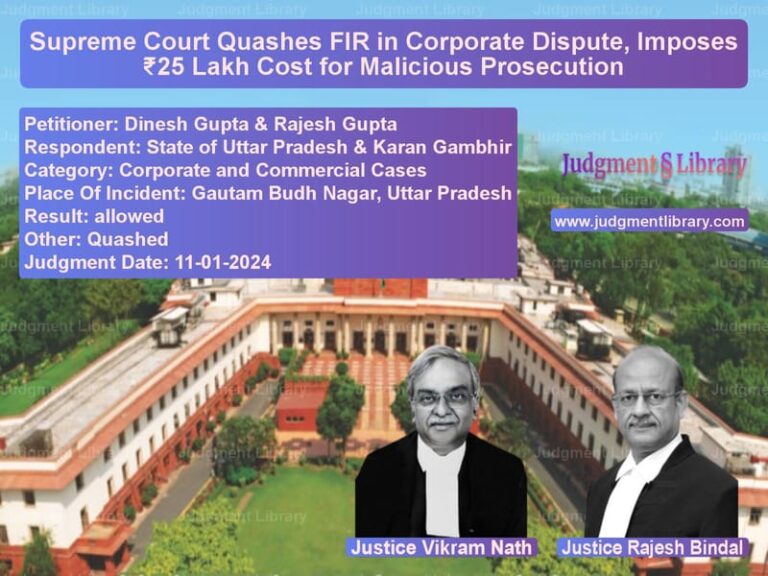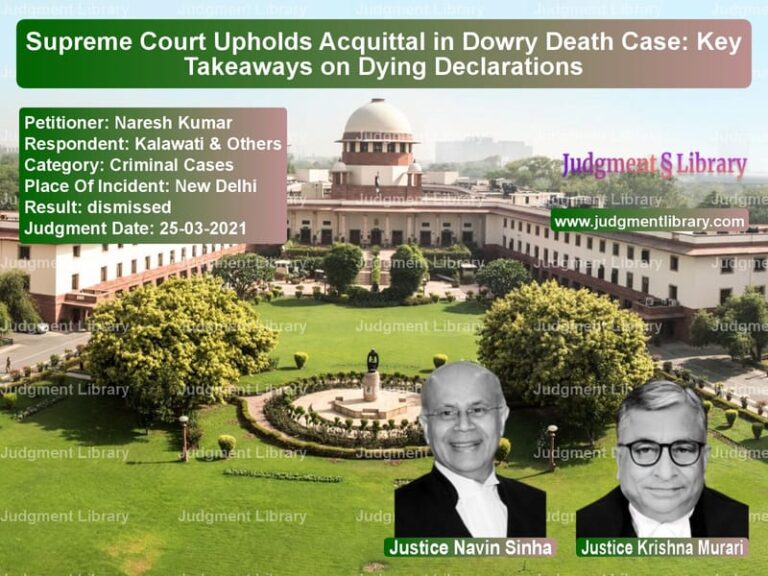Supreme Court Sets Aside Contempt Conviction: Lomesh Vidya Sagar vs. Punjab and Haryana High Court
The Supreme Court of India, in its judgment delivered on December 2, 2016, in the case of Lomesh Vidya Sagar vs. Court of Its Own Motion, Punjab and Haryana High Court, examined the application of contempt of court laws and the balance between judicial dignity and the right to seek redress. The case involved a conviction for contempt by the Punjab and Haryana High Court, with the Supreme Court ultimately setting aside the conviction on the grounds of an unconditional apology.
Background of the Case
Contempt of court laws are meant to ensure respect for the judiciary and prevent interference in the administration of justice. However, courts also recognize that an unconditional and unqualified apology may mitigate the consequences of a contempt conviction.
The appellant, Lomesh Vidya Sagar, was convicted by the Punjab and Haryana High Court for contempt of court. The High Court, through its Registrar General, had initiated contempt proceedings against him, resulting in a penalty of ₹1,00,000 across three cases.
Feeling aggrieved by the conviction and the financial penalty, the appellant approached the Supreme Court, challenging the decision on the grounds of procedural fairness and the appropriateness of the punishment.
Legal Issues Considered
- Whether the conviction of the appellant under the Contempt of Courts Act, 1971, was justified.
- Whether the High Court had appropriately exercised its powers in imposing a financial penalty.
- Whether an unconditional and unqualified apology by the appellant warranted the setting aside of the conviction and penalty.
- Whether the court should balance judicial authority with an individual’s right to fair hearing.
Petitioner’s (Lomesh Vidya Sagar) Arguments
- The appellant had tendered an unconditional and unqualified apology before the High Court.
- The conviction and financial penalty were excessive and disproportionate to the alleged contempt.
- The interests of justice would be served by setting aside the conviction, given his apologetic stand.
- There was no willful disobedience of court orders or deliberate attempt to interfere with the administration of justice.
Arguments of the Respondent (Punjab and Haryana High Court)
- The High Court had the authority under the Contempt of Courts Act, 1971, to punish for acts that interfere with the administration of justice.
- The conviction and financial penalty were imposed to uphold the dignity of the judiciary and to prevent future instances of contempt.
- The appellant’s conduct was serious enough to warrant strict action, as it could set a negative precedent if left unpunished.
- Allowing an apology to serve as an automatic defense could weaken the effectiveness of contempt laws.
Supreme Court’s Judgment
The Supreme Court, comprising Justice Kurian Joseph and Justice Rohinton Fali Nariman, ruled in favor of the appellant, making the following key observations:
- Since the appellant had expressed genuine remorse and had tendered an unconditional and unqualified apology, the conviction and penalty were set aside.
- The purpose of contempt proceedings is to ensure respect for judicial institutions rather than to impose excessive punishment.
- The appellant’s apology was accepted in good faith, and no further action was necessary.
- The Court emphasized that an apology must be genuine and must not be seen as a mere escape route from contempt proceedings.
Analysis of the Judgment
The ruling highlights the delicate balance between maintaining judicial dignity and ensuring fairness to individuals. The Supreme Court reiterated that courts should be cautious when exercising contempt powers, ensuring that penalties serve the intended purpose rather than being unnecessarily harsh.
At the same time, the Court clarified that an apology should not be an automatic ground for escaping liability. The sincerity and timing of the apology are critical in determining whether it should be accepted.
Key Legal Takeaways
- Apology as a Defense in Contempt Cases: A genuine apology may be considered a mitigating factor but should not be misused.
- Judicial Discretion: Courts have the discretion to set aside contempt convictions when satisfied that the ends of justice have been met.
- Purpose of Contempt Laws: The goal of contempt proceedings is to protect judicial authority, not to punish individuals arbitrarily.
- Proportionality in Contempt Punishments: The ruling highlights the need for proportionality in sentencing for contempt.
Implications of the Ruling
The Supreme Court’s ruling provides a clear guideline for lower courts when handling contempt cases. Some key implications include:
- Courts must assess whether an apology is genuine before deciding on penalties.
- Contempt proceedings should be used to maintain judicial decorum, not as a means of retribution.
- Individuals accused of contempt should be given an opportunity to express remorse and seek reconsideration.
Conclusion
The Supreme Court’s judgment in Lomesh Vidya Sagar vs. Court of Its Own Motion, Punjab and Haryana High Court underscores the principle that contempt powers should be exercised judiciously. By setting aside the conviction in light of the appellant’s unconditional apology, the judgment reaffirms the judiciary’s commitment to balancing respect for the court with fairness in legal proceedings.
Don’t miss out on the full details! Download the complete judgment in PDF format below and gain valuable insights instantly!
Download Judgment: Lomesh Vidya Sagar vs Court of Its Own Mot Supreme Court of India Judgment Dated 02-12-2016.pdf
Direct Downlaod Judgment: Direct downlaod this Judgment
See all petitions in Contempt Of Court cases
See all petitions in Judgment by Kurian Joseph
See all petitions in Judgment by Rohinton Fali Nariman
See all petitions in allowed
See all petitions in Quashed
See all petitions in supreme court of India judgments December 2016
See all petitions in 2016 judgments
See all posts in Constitutional Cases Category
See all allowed petitions in Constitutional Cases Category
See all Dismissed petitions in Constitutional Cases Category
See all partially allowed petitions in Constitutional Cases Category







